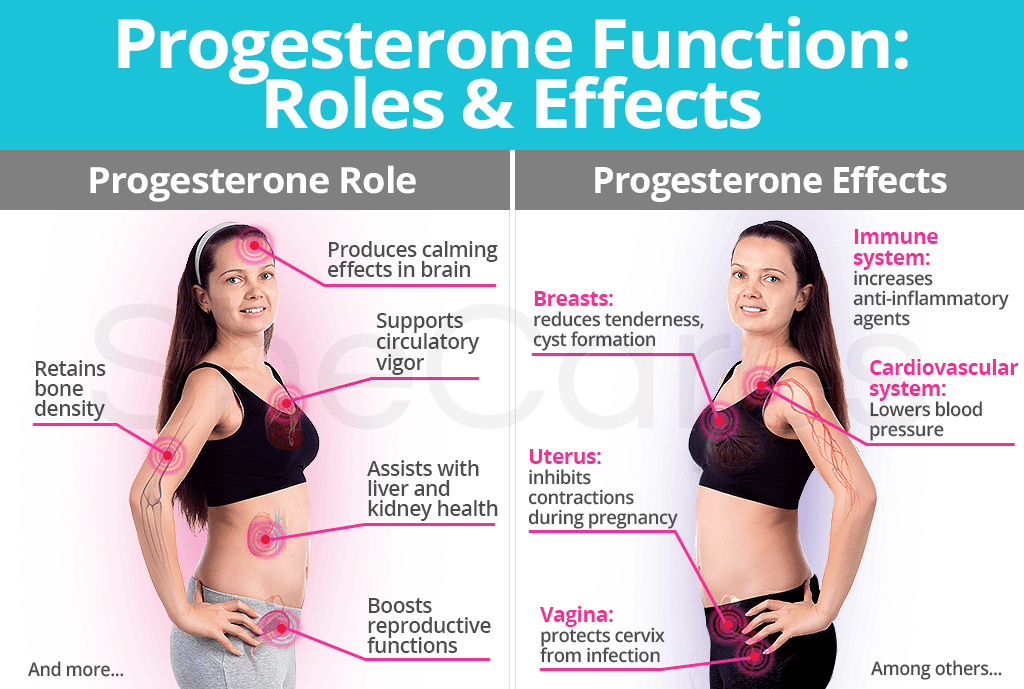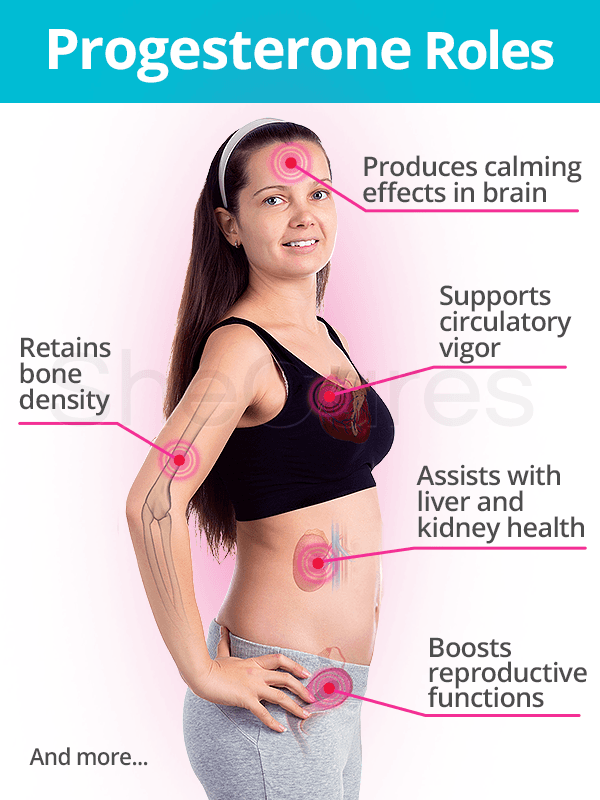
Progesterone plays a crucial role in regulating menstruation and supporting pregnancy in women. It is essential for maintaining overall reproductive health.
Progesterone, a key hormone in women’s health, regulates the menstrual cycle and supports pregnancy. It prepares the uterus for implantation, sustains early pregnancy, and prevents uterine contractions. Besides its reproductive functions, progesterone also influences mood, sleep, and overall well-being. Women may experience various symptoms, such as irregular periods and mood swings, due to progesterone imbalances.
Understanding the importance of progesterone helps in recognizing its role in maintaining hormonal balance. This knowledge empowers women to seek appropriate medical advice and treatment options, ensuring optimal health and well-being.
Introduction To Progesterone
Progesterone is a crucial hormone in women’s health. It plays key roles in reproductive health and overall well-being. Understanding progesterone can help women manage their health better. This section explores the functions, benefits, and importance of progesterone.
What Is Progesterone?
Progesterone is a natural hormone produced in the ovaries. It is also made in smaller amounts by the adrenal glands. This hormone belongs to a group called progestogens. Progesterone levels fluctuate during the menstrual cycle. They peak after ovulation and drop before menstruation.
| Source | Production |
|---|---|
| Ovaries | High amounts |
| Adrenal Glands | Low amounts |
Role In Women’s Health
Progesterone has many roles in women’s health. It prepares the uterus for pregnancy. It also supports early pregnancy by maintaining the uterine lining. Without enough progesterone, a woman may have difficulty conceiving.
Progesterone also balances other hormones. It works with estrogen to regulate the menstrual cycle. It helps prevent estrogen dominance, which can cause various health issues.
- Prepares the uterus for pregnancy
- Maintains uterine lining
- Balances estrogen levels
- Supports early pregnancy
Progesterone affects mood and well-being too. Low levels can lead to mood swings and anxiety. Maintaining proper levels is essential for mental health.
- Regulates menstrual cycle
- Prevents estrogen dominance
- Supports mental health
Understanding progesterone can lead to better health choices. Women should monitor their hormone levels for optimal well-being.

Credit: www.shecares.com
Hormonal Balance
Hormonal balance is crucial for women’s health. It affects mood, energy, and overall well-being. One of the key hormones involved is progesterone.
Progesterone And Estrogen
Progesterone and estrogen are primary female hormones. They play a vital role in the menstrual cycle.
Progesterone prepares the uterus for pregnancy. Estrogen helps in the development of female traits. Both hormones must be in balance.
Maintaining Balance
Maintaining hormonal balance is essential for health. Imbalances can cause various health issues.
A balanced diet and regular exercise help maintain hormone levels. Stress management is also important.
Doctors may recommend supplements or medications for severe imbalances. Regular check-ups ensure hormone levels stay balanced.
Menstrual Cycle Regulation
The menstrual cycle is a vital part of a woman’s reproductive system. It is regulated by hormones, with progesterone playing a key role. Understanding how progesterone influences the menstrual cycle can help women manage their health better.

Credit: www.shecares.com
Cycle Phases
The menstrual cycle consists of four distinct phases:
- Menstrual Phase: Days 1-5, when bleeding occurs.
- Follicular Phase: Days 1-13, when the egg matures.
- Ovulation Phase: Day 14, when the egg is released.
- Luteal Phase: Days 15-28, when the body prepares for pregnancy.
Progesterone’s Role
Progesterone is crucial during the luteal phase. It prepares the uterus for a potential pregnancy. If pregnancy does not occur, progesterone levels drop. This triggers the start of the menstrual phase.
During the follicular phase, progesterone levels are low. Estrogen dominates this phase, helping the egg mature. Once ovulation occurs, progesterone levels rise. This marks the beginning of the luteal phase.
Progesterone also helps regulate the menstrual cycle by balancing estrogen levels. This balance prevents the overgrowth of the uterine lining, reducing the risk of conditions like endometriosis.
| Cycle Phase | Key Hormones | Function |
|---|---|---|
| Menstrual Phase | Low Progesterone | Shedding of uterine lining |
| Follicular Phase | Low Progesterone, High Estrogen | Egg maturation |
| Ovulation Phase | Surge of LH and FSH | Egg release |
| Luteal Phase | High Progesterone | Uterus preparation for pregnancy |
Understanding the role of progesterone in menstrual cycle regulation is essential. This knowledge empowers women to make informed health decisions.
Reproductive Health
Progesterone plays a crucial role in women’s reproductive health. It supports various processes, ensuring a healthy reproductive system. Understanding its functions can help women maintain better overall health.
Fertility Support
Progesterone helps regulate the menstrual cycle. It prepares the body for conception. During the ovulation phase, progesterone levels rise. This thickens the uterine lining, making it ready for a fertilized egg.
Adequate progesterone levels are essential for successful implantation. Low progesterone can lead to difficulties in conceiving. Women with low levels may experience irregular menstrual cycles. They might also face challenges in achieving pregnancy.
| Function | Role |
|---|---|
| Regulates Menstrual Cycle | Ensures regular ovulation |
| Thickens Uterine Lining | Prepares for implantation |
| Supports Implantation | Enables embryo attachment |
Pregnancy Maintenance
During pregnancy, progesterone levels increase significantly. It maintains the uterine lining, preventing it from shedding. This helps sustain the pregnancy.
Progesterone also reduces uterine contractions. This lowers the risk of premature labor. It boosts the immune system, protecting the developing fetus.
- Maintains uterine lining
- Reduces uterine contractions
- Boosts immune system
Low progesterone during pregnancy can lead to complications. Women might experience early miscarriages. Monitoring progesterone levels is vital for a healthy pregnancy.
Mood And Emotional Well-being
Progesterone is a vital hormone for women’s health. It significantly impacts mood and emotional well-being. This hormone helps maintain a balanced emotional state. Below, we explore its effects on mood and stress reduction.
Impact On Mood
Progesterone plays a crucial role in mood regulation. It interacts with brain chemicals such as serotonin and dopamine. These chemicals are known as neurotransmitters. They help regulate mood and feelings of happiness.
Low levels of progesterone can lead to mood swings. Women may feel irritable, anxious, or depressed. Maintaining balanced progesterone levels can improve mood stability.
| Neurotransmitter | Effect on Mood |
|---|---|
| Serotonin | Promotes feelings of well-being and happiness |
| Dopamine | Regulates pleasure and reward |
Stress Reduction
Progesterone helps reduce stress by calming the nervous system. It promotes relaxation and better sleep quality. Adequate sleep is essential for emotional health.
- Reduces anxiety levels
- Helps manage stress more effectively
- Improves overall mental health
Higher progesterone levels can lower cortisol, the stress hormone. This balance is vital for reducing chronic stress.
In summary, progesterone is essential for mood and emotional well-being. It stabilizes mood and reduces stress, enhancing overall mental health.

Credit: www.shecares.com
Bone Health
Progesterone plays a crucial role in women’s health, particularly in maintaining healthy bones. Let’s dive into how this hormone contributes to bone health, focusing on bone density and protection against osteoporosis.
Bone Density
Progesterone influences bone density by stimulating bone formation. It works together with estrogen to maintain a balance. This balance is vital for strong, healthy bones. Without enough progesterone, bones can become weak. This can lead to fractures and other complications.
During menopause, progesterone levels drop. This drop can reduce bone density. Women may experience more bone loss during this time. Maintaining progesterone levels can help prevent this.
Protection Against Osteoporosis
Osteoporosis is a condition where bones become brittle. It increases the risk of fractures. Progesterone helps in the protection against osteoporosis. It supports bone remodeling, a natural process where old bone is replaced with new bone.
Maintaining balanced progesterone levels is crucial. It ensures bones remain strong and reduces the risk of osteoporosis. Women, especially post-menopausal, need to monitor their hormone levels. This can be done through regular check-ups and consultations with healthcare providers.
Here is a simple table summarizing the benefits of progesterone for bone health:
| Benefit | Description |
|---|---|
| Bone Density | Stimulates bone formation and maintains balance with estrogen. |
| Protection Against Osteoporosis | Supports bone remodeling and reduces the risk of fractures. |
In summary, progesterone is essential for maintaining bone health. It helps keep bones strong and reduces the risk of osteoporosis.
Skin Health
Progesterone plays a crucial role in women’s skin health. Its influence on collagen production and hydration makes it essential for maintaining youthful, clear skin. Let’s explore how this hormone benefits the skin in various ways.
Anti-aging Benefits
Progesterone helps maintain skin elasticity and firmness. It stimulates collagen production, which keeps the skin plump and youthful.
As women age, progesterone levels decline. This can lead to wrinkles and sagging skin. By supporting collagen, progesterone helps slow down these aging signs.
Hydration is another key benefit. Progesterone enhances the skin’s ability to retain moisture. Well-hydrated skin appears smoother and more radiant.
Acne Prevention
Progesterone helps regulate oil production in the skin. Balanced oil levels prevent clogged pores and acne breakouts.
Low progesterone levels can lead to hormonal imbalances. These imbalances often result in increased sebum production and acne.
Maintaining healthy progesterone levels can keep the skin clear. It reduces the chances of developing acne.
:max_bytes(150000):strip_icc()/what-to-know-about-progesterone-cream-89503_FINAL-14c21b67a0e143d69085acd7d0739025.png)
Credit: www.verywellhealth.com
Weight Management
Progesterone plays a significant role in weight management for women. This hormone influences many bodily functions that help maintain a healthy weight. Understanding how progesterone impacts metabolism and appetite can assist in managing weight effectively.
Metabolism Boost
Progesterone helps to boost metabolism. A higher metabolism means burning more calories. This process is vital for weight control.
- Increases energy expenditure
- Enhances fat burning
- Reduces fat storage
With a higher metabolism, your body uses calories more efficiently. This can help prevent weight gain and promote weight loss.
Appetite Control
Progesterone also aids in appetite control. It helps regulate hunger signals and food intake.
- Reduces cravings
- Promotes feelings of fullness
- Balances blood sugar levels
By controlling your appetite, progesterone helps you avoid overeating. This can lead to better weight management and overall health.
| Function | Benefit |
|---|---|
| Boosts Metabolism | Burns more calories |
| Controls Appetite | Reduces overeating |
Cardiovascular Health
Progesterone plays a crucial role in women’s cardiovascular health. Its impact extends beyond reproductive functions. Understanding how progesterone supports the heart can enhance women’s overall well-being.
Heart Protection
Progesterone offers significant heart protection for women. It helps to maintain healthy blood vessels. This hormone reduces the risk of blood clots. It also improves blood flow to the heart. These benefits lower the risk of heart attacks. Progesterone’s anti-inflammatory properties further protect the heart.
Cholesterol Regulation
Progesterone is essential for cholesterol regulation. It helps balance good and bad cholesterol levels. This hormone increases HDL (good cholesterol). It also lowers LDL (bad cholesterol). Balanced cholesterol levels reduce the risk of heart disease. Progesterone supports a healthy lipid profile, promoting cardiovascular health.
| Benefit | Description |
|---|---|
| Heart Protection | Maintains blood vessels, reduces clots, improves flow, anti-inflammatory |
| Cholesterol Regulation | Balances HDL and LDL, supports a healthy lipid profile |
Sleep Quality
Progesterone plays a crucial role in women’s health, influencing many aspects of well-being. One important area is sleep quality. Good sleep is essential for physical and mental health. Progesterone helps women achieve restful and rejuvenating sleep.
Promoting Restful Sleep
Progesterone helps promote restful sleep in women. It has a calming effect on the brain. This hormone aids in reducing stress and anxiety, which can disrupt sleep. A calm mind helps you fall asleep faster and stay asleep longer.
Progesterone increases the production of GABA, a brain chemical. GABA promotes relaxation and reduces brain activity. This helps in achieving deep, restorative sleep. Women with balanced progesterone levels often experience better sleep quality.
Combating Insomnia
Insomnia is a common issue many women face. Progesterone can be a natural remedy for this problem. Low levels of progesterone can lead to sleep disturbances. Supplementing progesterone can help restore healthy sleep patterns.
Women with higher progesterone levels report fewer instances of waking up at night. They also find it easier to fall back asleep if they do wake up. This hormone helps in maintaining a regular sleep cycle, combating insomnia effectively.
Progesterone therapy can be an effective treatment for those struggling with chronic insomnia. It is a safer alternative to sleeping pills, with fewer side effects.
Immune System Support
Progesterone plays a crucial role in supporting the immune system in women. This hormone helps the body fight infections and maintain overall health.
Inflammation Reduction
Progesterone helps reduce inflammation in the body. Inflammation is the body’s response to injury or infection. It can sometimes cause more harm than good. Progesterone controls this by calming the immune response.
- Reduces chronic inflammation
- Helps in healing tissues
- Prevents overactive immune responses
Studies show that progesterone lowers levels of inflammatory markers. This helps in reducing the risk of autoimmune diseases.
Enhanced Immunity
Progesterone boosts the body’s immune response to various pathogens. It increases the production of protective antibodies. These antibodies fight off viruses and bacteria.
Women with balanced progesterone levels experience fewer infections. They also recover faster from illnesses. Let’s look at some key benefits:
| Benefit | Description |
|---|---|
| Stronger Immunity | Helps produce more antibodies |
| Faster Recovery | Speeds up healing from infections |
| Lower Risk of Diseases | Reduces autoimmune disease risk |
Overall, progesterone is vital for a healthy immune system in women. It provides both inflammation reduction and enhanced immunity.
Menopause Management
Menopause is a natural phase in a woman’s life. It brings various physical and emotional changes. Managing these changes effectively is crucial for overall well-being. Progesterone plays a vital role in menopause management.
Symptom Relief
Progesterone helps alleviate common menopausal symptoms. These include hot flashes, night sweats, and mood swings. It also aids in reducing anxiety and depression. By balancing hormones, progesterone promotes better sleep quality.
Another benefit is its role in preventing uterine lining thickening. This helps reduce the risk of endometrial cancer. Women often experience fewer headaches and migraines with adequate progesterone levels.
- Reduces hot flashes and night sweats
- Alleviates mood swings and anxiety
- Improves sleep quality
- Prevents uterine lining thickening
Hormone Replacement Therapy
Hormone Replacement Therapy (HRT) is a common treatment for menopause symptoms. It involves the administration of hormones like estrogen and progesterone. Progesterone is essential in HRT to counterbalance estrogen’s effects.
Without progesterone, estrogen can cause the uterine lining to grow excessively. This increases the risk of endometrial cancer. HRT with progesterone helps maintain hormonal balance. It ensures the safe and effective relief of menopausal symptoms.
HRT can be administered in various forms:
- Pills
- Patches
- Gels
- Injections
Each method has its benefits and drawbacks. Consult a healthcare provider to determine the best option.
| Form of HRT | Advantages | Disadvantages |
|---|---|---|
| Pills | Easy to take | May cause gastrointestinal issues |
| Patches | Steady hormone release | Skin irritation |
| Gels | Easy application | Messy |
| Injections | Long-lasting | Painful |
Common Disorders
Progesterone plays a key role in women’s health. When there are issues with progesterone, it can lead to various disorders. Understanding these disorders is crucial for maintaining overall well-being.

Credit: www.shecares.com
Progesterone Deficiency
Progesterone deficiency can affect various body functions. Symptoms include irregular periods, mood swings, and weight gain.
- Irregular periods: Menstrual cycles can become erratic.
- Mood swings: Emotional instability may occur.
- Weight gain: Difficulty in managing weight is common.
Causes of progesterone deficiency can vary. Common causes include stress, aging, and poor diet. Diagnosis usually involves blood tests and symptom analysis.
PCOS And Endometriosis
Both PCOS (Polycystic Ovary Syndrome) and endometriosis are linked to hormonal imbalances. Progesterone plays a significant role in these conditions.
| Condition | Key Symptoms | Role of Progesterone |
|---|---|---|
| PCOS | Irregular periods, acne, weight gain | Low progesterone levels contribute to symptoms |
| Endometriosis | Pelvic pain, heavy periods, infertility | Progesterone therapy can help manage symptoms |
Managing PCOS often involves lifestyle changes and medications. Endometriosis treatment may include hormone therapy and surgery.
Understanding these disorders helps in early diagnosis and treatment. Always consult healthcare professionals for personalized advice.
Natural Sources
Understanding the natural sources of progesterone is essential for women’s health. Progesterone plays a vital role in regulating the menstrual cycle, supporting pregnancy, and maintaining overall well-being. Incorporating natural sources of progesterone into your daily routine can help balance hormone levels and improve health outcomes.
Dietary Sources
Several foods can help boost progesterone levels naturally. Incorporating these foods into your diet can promote hormonal balance.
| Food | Description |
|---|---|
| Yams | Yams contain diosgenin, which may help stimulate progesterone production. |
| Walnuts | Walnuts are rich in omega-3 fatty acids, supporting hormone health. |
| Spinach | Spinach is high in magnesium, which is essential for hormone regulation. |
| Poultry | Poultry provides protein and zinc, which support progesterone production. |
| Pumpkin Seeds | Pumpkin seeds are a good source of zinc, aiding hormone balance. |
Lifestyle Tips
Adopting healthy lifestyle habits can further support natural progesterone levels. Consider these tips for a balanced approach to hormone health.
- Reduce Stress: High stress levels can lower progesterone. Practice relaxation techniques like yoga and meditation.
- Maintain a Healthy Weight: Excess body fat can affect hormone levels. Aim for a balanced diet and regular exercise.
- Get Enough Sleep: Quality sleep is crucial for hormone production. Aim for 7-9 hours of sleep per night.
- Avoid Excessive Exercise: Overtraining can lower progesterone. Balance workout intensity with adequate rest.
- Limit Caffeine and Alcohol: High intake of caffeine and alcohol can disrupt hormone balance. Consume them in moderation.
By focusing on these dietary sources and lifestyle tips, you can naturally support progesterone levels and enhance your overall health.
Supplementation
Progesterone plays a crucial role in women’s health. Supplementation can help balance hormone levels. It can alleviate various symptoms and improve overall well-being. Let’s explore the types of supplements and their safety and efficacy.

Types Of Supplements
There are several types of progesterone supplements available. Each type has unique benefits and uses.
- Oral Supplements: These come in pill form. They are easy to take.
- Topical Creams: These are applied to the skin. They offer direct absorption.
- Injections: These are administered by a healthcare provider. They provide precise dosing.
- Vaginal Suppositories: These are inserted into the vagina. They target specific reproductive issues.
Safety And Efficacy
Safety and efficacy are essential when considering progesterone supplements. Here are key points to keep in mind:
| Type | Safety | Efficacy |
|---|---|---|
| Oral Supplements | Generally safe with doctor supervision | Effective for overall hormone balance |
| Topical Creams | Safe for most users | Highly effective with proper application |
| Injections | Requires medical supervision | Very effective for targeted therapy |
| Vaginal Suppositories | Safe for reproductive issues | Effective for localized treatment |
Consult a healthcare provider before starting any supplement. They can advise on the best type for your needs.
Frequently Asked Questions
What Does Progesterone Stimulate In Females?
Progesterone stimulates the thickening of the uterine lining, preparing it for a fertilized egg. It also regulates menstrual cycles and supports early pregnancy.
What Happens To Your Body When You Start Taking Progesterone?
Progesterone can regulate menstruation, reduce menopause symptoms, and support pregnancy. It may cause mood changes, weight gain, or fatigue.
What Are The Symptoms Of High Progesterone In Females?
High progesterone symptoms in females include mood swings, bloating, breast tenderness, fatigue, and headaches. Some may experience weight gain and decreased libido.
What Happens If Progesterone Is Low?
Low progesterone can cause irregular periods, infertility, and mood swings. It may lead to miscarriage during pregnancy. Consult a doctor.
Conclusion
Understanding progesterone is crucial for women’s health. It regulates menstrual cycles, supports pregnancy, and balances hormones. Regular check-ups ensure optimal progesterone levels. Prioritize your health by staying informed about this essential hormone.
 Reproductive Health Sexual and Reproductive Health
Reproductive Health Sexual and Reproductive Health






